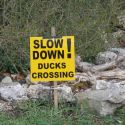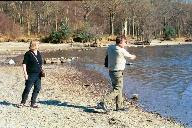Over to the bakery for a large loaf of the sesame covered dense rye bread. Our first stop in case they run out, which does have the disadvantage of having to carry the bread for the rest of the walk. Then a stop at our favourite charity shop. They do, surprisingly, have one of Louise Penny’s books, but it’s one I’ve read. Just as well, really, as we’re not short of reading material. Less than half way through Seymour Hersh’s memoirs, though more than half way through the loan time, so if we don’t speed up it will disappear from the iPad before we’re finished. More ebooks waiting, but they’re ones we own, so no hurry.
The only other people in the charity shop are the woman in charge, whom I’ve chatted with in the past, and a very distressed female customer. The customer is recounting her difficulties with Cypriot banks, which appear to have been giving money from her (not joint) account to her “soon to be ex”. Both women are totally engrossed in what seems to be a fairly horrific account, and are discussing remedies including suing the banks. It’s a complex story, I tell J after we leave. Were you listening? Well, hearing. But there were confusing bits and I could hardly ask for clarification.
Sit for a bit on a bench down at the waterfront after finding a suitable bench - half in shade for me and half in sun for J. Tables all full at our usual coffee shop, so another bench stop up near St Lazarus Church. A lovely and very old part of the city. The name Larnaca means coffin, and had always assumed that this was in reference to the fact that the Biblical Lazarus was thought to have been buried in the (now empty) crypt of the church named after him. However, a municipal website would have it otherwise: “Larnaca was known as Kition as it is believed that Noah's grandson, Khittim, established the first settlement about 6000 years ago. The modern name of the city; which means coffins in Greek ('Larnax') was derived because of the many burial sites found on Kition settlements.” Believed by whom for heaven’s sake? There were very early Christian settlements in Cyprus, a little over 2000 years ago and well within sailing distance from the Middle East. But Noah?! The Larnaca site goes on to explain: “While other settlements in Cyprus were abandoned later, Larnaca developed into a city because of its ancestors who inhabited it continuously”. So all is made clear.





